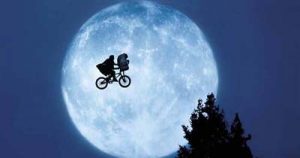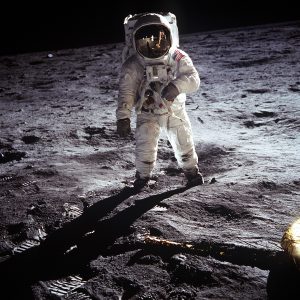Does the full moon affect our behaviour?
Tomorrow there will be a Super Moon and many people believe that a full moon makes us crazy, but is this true? Will we be going barking mad tomorrow?
The lunatics are on the loose!
According to popular belief, a full moon causes all kind of disasters: higher crime and suicide rates, causes depression and anxiety, more prison violence, more domestic violence, drug and alcohol abuse, traffic accidents, induced child births, increased mental illness, and chaos in emergency rooms. One survey in the US found that 43% of the people believe that the full moon affects us. Among people working in mental health a whopping 81% believe this!
If this is true, then designers of hospitals, prisons and public space should take note of this. Perhaps, we should even start building emergency shelters.
Moon cycles

So how does this work? There seem to be two theories about the full moon effect. The first theory is that a full moon shines brighter, so we don’t sleep as well and this causes problems. This theory seems plausible, we definitely see animals behaving differently under a full moon.
The other theory is that a full moon pulls the earth more strongly, either by gravity or a magnetic field. However, this doesn’t make sense. The moon is this close to earth EVERY month and super moons happen at least every 14 months. Sea levels will most likely rise by just a few centimeters under a super moon.
Will we be going barking mad tomorrow?
Big moon, big data
Sorry to disappoint, but no! Objective research shows that there is no increase in violent crimes, suicide rates, emergency calls, psychological incidences and so on when there is a full moon. The number of people reporting to the emergency department is actually slightly lower during a full moon. Perhaps because we can see better during those nights and there are less accidents? Also, under a full moon the same number of babies are born as on any other day.
Some research did show full moon effects. Big surprise: under a full moon, there is less money to be made on the stock market. This effect is seen in the US, Asia and Europe. Unfortunately, we cannot say that the moon affects the stock market directly. Correlation does not equal causation. Just because things happen at the same time, doesn’t mean that one causes the other. Maybe the full moon makes us think we are a little bit crazier so we act crazier and that’s why things go wrong.
Sticky beliefs
So despite the evidence, people keep believing in the full moon. Why does it  stick? Most likely we are being fooled by our own brain. We suffer from selective recall, confirmation bias and communal reinforcement. We remember crazy things better and we look for information that confirms what we believe. And once many people believe something, more people will start to believe it. When everybody says it, it must be true. Does it matter that we keep believing in something that isn’t true? Maybe not so much. But what if we start using these irrational beliefs as an excuse for bad behaviour?
stick? Most likely we are being fooled by our own brain. We suffer from selective recall, confirmation bias and communal reinforcement. We remember crazy things better and we look for information that confirms what we believe. And once many people believe something, more people will start to believe it. When everybody says it, it must be true. Does it matter that we keep believing in something that isn’t true? Maybe not so much. But what if we start using these irrational beliefs as an excuse for bad behaviour?
Conclusion:
We might go crazy tomorrow, but I gravitate towards believing it is lunacy to blame it on the moon. Yet, I am open to hear about examples that would prove this wrong….
Not making this up:
Arliss, J.M. Kaplan,E.N., & Galvin, S.L. (2005) The effect of the lunar cycle on frequency of births and birth complications. American Journal of Obstetrics and Gynecology, 192, 5, 1462-1464. http://dx.doi.org/10.1016/j.ajog.2004.12.034.
Barr W. (2000) Lunacy revisited. The influence of the moon on mental health and quality of life. Journal of Psychosocial Nursing and Mental Health Services [2000, 38(5):28-35]
BAUER, S.F. & HORNICK, E.J. (1968) Lunar Effect on Mental Illness: The Relationship of Moon Phase to Psychiatric Emergencies. American Journal of Psychiatry, 125:696-697.
Belleville,G., Foldes-Busque,G., Dixon,M., Marquis-Pelletier,E., Barbeau,S., Poitras,J., Chauny,J, Diodati,J., Fleet,R. & Marchand, A. (2013) Impact of seasonal and lunar cycles on psychological symptoms in the ED: an empirical investigation of widely spread beliefs. General hospital psychiatry, 35,2 192-194. DOI: 10.1016/j.genhosppsych.2012.10.002)
Law SP. (1986) The regulation of menstrual cycle and its relationship to the moon. Acta Obstetrics and Gynaecology. 65:45–48.
Morton-Pradhan, S., Bay, R., Coonrod, D. (2005) Birth rate and its correlation with the lunar cycle and specific atmospheric conditions.
American Journal of Obstetrics and Gynecology, 192, 6, 1970–1973. http://dx.doi.org/10.1016/j.ajog.2005.02.066
Myers DE. (1995) Gravitational effects of the period of high tides and the new moon on lunacy. Journal of Emergency Medicine. 1995;13:529–532
Raison, C., Haven, M.K. & Steckler, M. (1999) The Moon and Madness Reconsidered. Journal of Affective Disorders; PP.99-106.
Rotton, J., Kelly, I. W. (1985) Much ado about the full moon: A meta-analysis of lunar-lunacy research. Psychological Bulletin, Vol 97(2), 286-306.
Rüegg, S., Hunziker, P., Marsch, S. & Schindler, C. (2008). Association of environmental factors with the onset of status epilepticus. Epilepsy & Behavior, 12, 1, 66–73. http://dx.doi.org/10.1016/j.yebeh.2007.08.020
Schafer, J.A., Varano, S.P., Jarvis, J.P. & Cancino, J.M. (2010) Bad moon on the rise? Lunar cycles and incidents of crime. Journal of Criminal Justice 38:4, 359-367
Stomp, W., Fidler, V., ten Duis, H., Nijsten, M. W. N. (2009) Relation of the Weather and the Lunar Cycle With the Incidence of Trauma in the Groningen Region Over a 36-Year Period. Journal of Trauma-Injury Infection & Critical Care. 67, 5, 1103-1108. doi: 10.1097/TA.0b013e3181986941
Vance, D. E. (1995) Belief in lunar effects on human behavior. Psychological Reports, Vol 76(1), Feb, 32-34. doi: 2466/pr0.1995.76.1.32

Leave a Reply